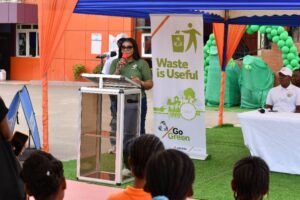Access Bank (Ghana) Plc has launched phase two of its ‘Waste is Useful’ project, one of its environmental sustainability initiatives with the aim of training over 150,000 school children in 300 basic schools on recycling and the need for sustainable use of resources.
In Ghana, single-use plastics, such as plastic bottles, have become an enduring menace that affects the environment. Approximately 5% of plastic waste is collected for recycling each year, with the rest finding its way on landfills and in the ocean.
Launched at ROKA International School at Amasaman, Accra, the ‘Waste is Useful’ project seeks to train children on proper waste management over the next three months, provide special waste bins for clean waste collection, and monetize clean waste collection for the schools (waste-to-wealth). The project is being implemented in the Ga North and Ga West Municipal Assemblies in Accra.
Speaking at the launch, Group Head of Retail Banking at Access Bank, Matilda Asante-Asiedu, emphasized the significance of introducing children to recycling. “There is an urgent need to also get schools and the youth actively involved in ensuring that the environment is well protected and conserved for posterity.
She added that “through our efforts, we aim to foster a culture of sustainability, where students from a young age actively contribute to a cleaner environment.
By pledging to keep their schools and communities clean and engaging in upcycling projects, our schools will become key players in promoting environmental responsibility and driving positive change in waste segregation practices,” she said.

‘Waste is Useful’ phase 2 was launched in partnership with GoG Aid Foundation, a non- governmental organizational that aims to promote social gerontology, advocacy and provide support to children, women, and older folks in Ghana in health, education, and shelter.
Operations officer at GoG Aid Foundation, Nana Akorle Annan expressed appreciation to Access Bank for the partnership to raise a new generation of environmentally conscious leaders.
Other project partners include the Environmental Protection Agency (EPA) and Namarco, a subsidiary of waste management company, Zoomlion Ghana.
As part of the project, Roka International School received receptacles for waste segregation to facilitate recycling and proper waste management. Students were also taught practical skills on recycling and how to transform waste materials into valuable products.
The first phase of the ‘Waste is Useful’ project saw Access Bank (Ghana) Plc embark on an internal campaign of waste segregation and a shift from single-use plastics to reusable items. The campaign, hinged on SDG 12 “promoting responsible consumption and production” will promote best sustainable practices by reducing the negative impacts associated with waste generation.
The ‘Waste is Useful’ campaign is one of Access Bank’s commitment to leading the way towards a sustainable future. Access Bank is committed to reducing our carbon footprint and promoting green energy solutions.
Operating from 55 business locations across Ghana with presence in 22 countries in Africa and the rest of the world including the UAE, UK, Hong Kong, and France along with three representative offices in China, India, and Lebanon, the Bank actively invests in initiatives that promote environmental conservation, community development, and social well-being in areas of environment, health, education, and enterprise impacting lives now and in the future.
The Bank has received various awards including the Most Innovative Bank for Community Engagement from International Finance awards in 2024 and Project of the Year, Environment from Sustainability & Social Investment (SSI) awards in 2023.










